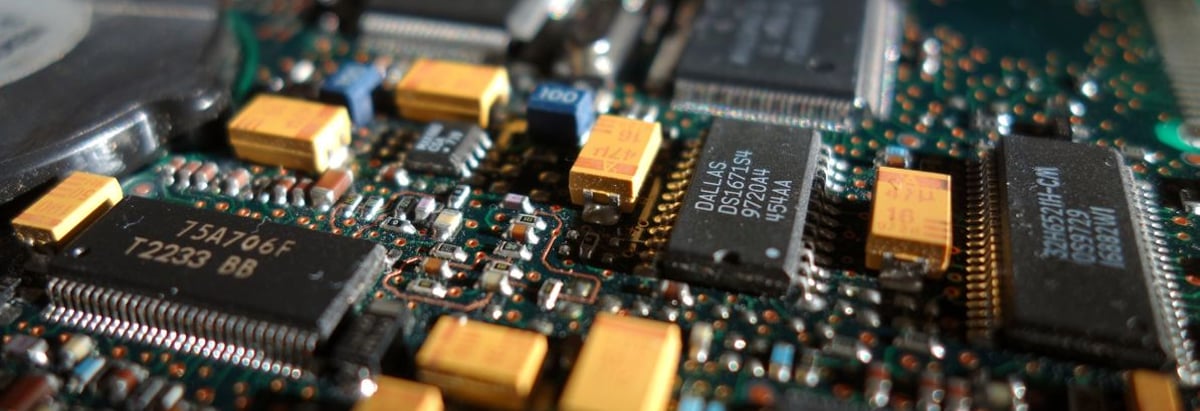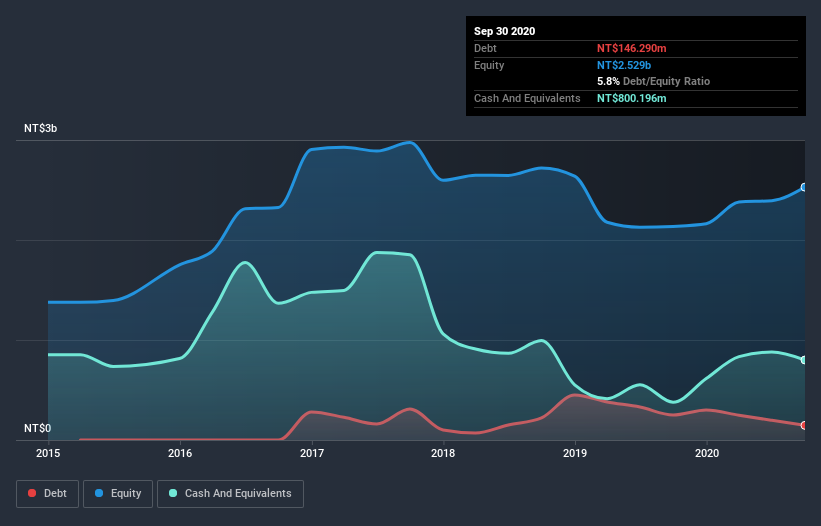
David Iben put it well when he said, 'Volatility is not a risk we care about. What we care about is avoiding the permanent loss of capital.' So it might be obvious that you need to consider debt, when you think about how risky any given stock is, because too much debt can sink a company. We can see that AP Memory Technology Corporation (TPE:6531) does use debt in its business. But is this debt a concern to shareholders?
When Is Debt Dangerous?
Debt assists a business until the business has trouble paying it off, either with new capital or with free cash flow. In the worst case scenario, a company can go bankrupt if it cannot pay its creditors. However, a more frequent (but still costly) occurrence is where a company must issue shares at bargain-basement prices, permanently diluting shareholders, just to shore up its balance sheet. Of course, debt can be an important tool in businesses, particularly capital heavy businesses. The first step when considering a company's debt levels is to consider its cash and debt together.
Check out our latest analysis for AP Memory Technology
What Is AP Memory Technology's Debt?
As you can see below, AP Memory Technology had NT$146.3m of debt at September 2020, down from NT$250.0m a year prior. However, its balance sheet shows it holds NT$800.2m in cash, so it actually has NT$653.9m net cash.

A Look At AP Memory Technology's Liabilities
We can see from the most recent balance sheet that AP Memory Technology had liabilities of NT$795.6m falling due within a year, and liabilities of NT$112.8m due beyond that. Offsetting these obligations, it had cash of NT$800.2m as well as receivables valued at NT$535.1m due within 12 months. So it actually has NT$426.9m more liquid assets than total liabilities.
This state of affairs indicates that AP Memory Technology's balance sheet looks quite solid, as its total liabilities are just about equal to its liquid assets. So it's very unlikely that the NT$49.0b company is short on cash, but still worth keeping an eye on the balance sheet. Simply put, the fact that AP Memory Technology has more cash than debt is arguably a good indication that it can manage its debt safely.
Although AP Memory Technology made a loss at the EBIT level, last year, it was also good to see that it generated NT$242m in EBIT over the last twelve months. The balance sheet is clearly the area to focus on when you are analysing debt. But you can't view debt in total isolation; since AP Memory Technology will need earnings to service that debt. So when considering debt, it's definitely worth looking at the earnings trend. Click here for an interactive snapshot.
Finally, while the tax-man may adore accounting profits, lenders only accept cold hard cash. AP Memory Technology may have net cash on the balance sheet, but it is still interesting to look at how well the business converts its earnings before interest and tax (EBIT) to free cash flow, because that will influence both its need for, and its capacity to manage debt. Happily for any shareholders, AP Memory Technology actually produced more free cash flow than EBIT over the last year. There's nothing better than incoming cash when it comes to staying in your lenders' good graces.
Summing up
While it is always sensible to investigate a company's debt, in this case AP Memory Technology has NT$653.9m in net cash and a decent-looking balance sheet. And it impressed us with free cash flow of NT$324m, being 134% of its EBIT. So is AP Memory Technology's debt a risk? It doesn't seem so to us. There's no doubt that we learn most about debt from the balance sheet. But ultimately, every company can contain risks that exist outside of the balance sheet. For example AP Memory Technology has 3 warning signs (and 1 which is significant) we think you should know about.
At the end of the day, it's often better to focus on companies that are free from net debt. You can access our special list of such companies (all with a track record of profit growth). It's free.
If you’re looking to trade AP Memory Technology, open an account with the lowest-cost* platform trusted by professionals, Interactive Brokers. Their clients from over 200 countries and territories trade stocks, options, futures, forex, bonds and funds worldwide from a single integrated account. Promoted
New: Manage All Your Stock Portfolios in One Place
We've created the ultimate portfolio companion for stock investors, and it's free.
• Connect an unlimited number of Portfolios and see your total in one currency
• Be alerted to new Warning Signs or Risks via email or mobile
• Track the Fair Value of your stocks
This article by Simply Wall St is general in nature. It does not constitute a recommendation to buy or sell any stock, and does not take account of your objectives, or your financial situation. We aim to bring you long-term focused analysis driven by fundamental data. Note that our analysis may not factor in the latest price-sensitive company announcements or qualitative material. Simply Wall St has no position in any stocks mentioned.
*Interactive Brokers Rated Lowest Cost Broker by StockBrokers.com Annual Online Review 2020
Have feedback on this article? Concerned about the content? Get in touch with us directly. Alternatively, email editorial-team (at) simplywallst.com.
About TWSE:6531
AP Memory Technology
Engages in designing, development, licensing, manufacturing, and selling customized memory-related integrated circuit (IC) chip products and technologies in China, Japan, Taiwan, Europe, America, and internationally.
Flawless balance sheet with high growth potential and pays a dividend.
Similar Companies
Market Insights
Community Narratives


